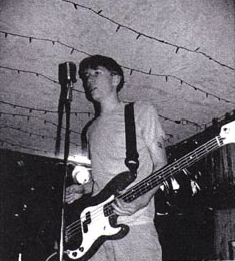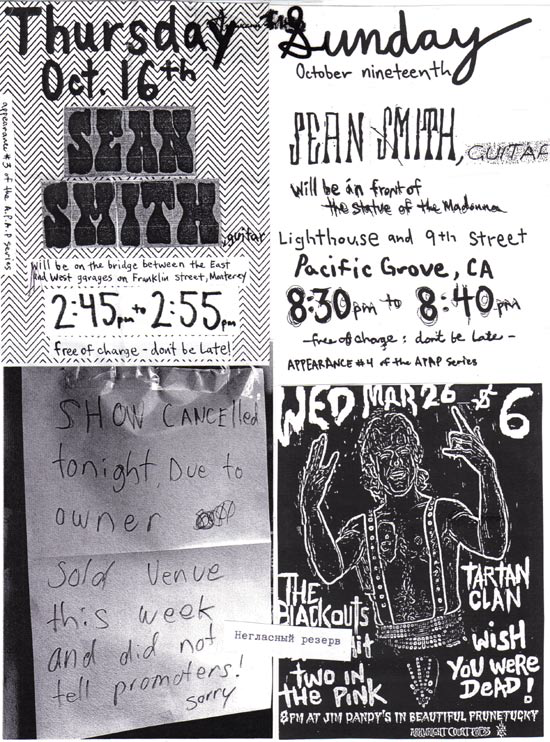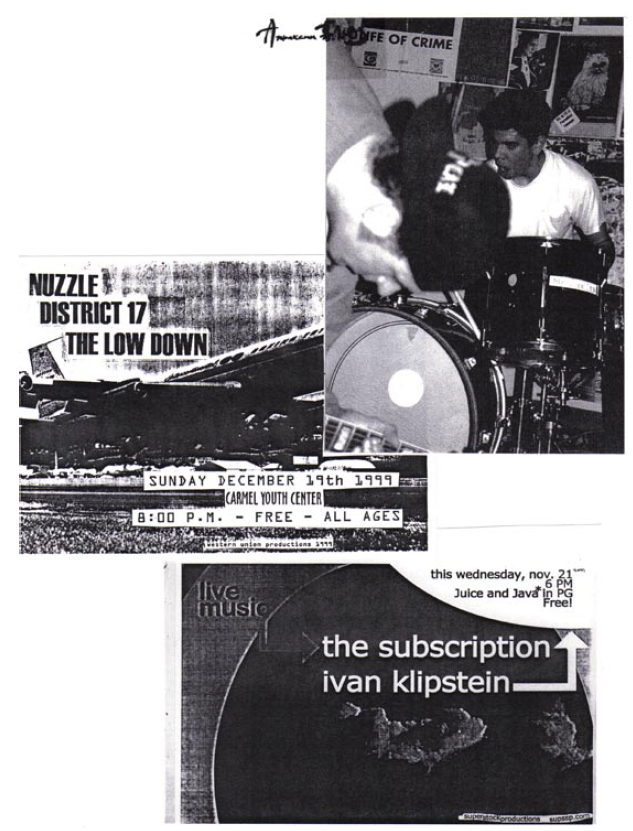Outlaw Booking
Published in: 12. Registers of Risk
Not everybody comes into the world with something to say. There’s a chance, though, that you’re one of those people born with a wish to express the human condition through art — and namely through music. Sharing one’s music with friends and family is great, and for many this audience alone may suffice, but this inner circle often doesn’t quench the insatiable desire for an artist to reach out to perfect strangers.
When I was 19, a friend and I formed a band called District 17. As a two-piece, we recorded a five-song 7″ record, where I doubled as drummer and bassist. We mistakenly thought with this 7″ we could convince a small record label to sign us for an LP. Problem was, our slightly-complicated punk rock recipe could not cook live with only two musicians playing, and no label wants a band that can’t perform. So we asked one of our musician friends to be our drummer. He said yes, and we practiced a few times and then began to book some local shows.
It was the momentum we built from these initial self-booked shows that led us to eventually record a second 12″ record (a split record, with a band from Olympia, Washington on the other side), tour the U.S. two times and then — after about 130 shows — fulfill a dream when my band signed to a small record label for a full-length album in 2000 (in our case, with Little Echoes from Berkeley, California).
I’d like to share with you now how in our early days we arranged and booked shows. With only a little motivation and effort, you can easily succeed at reaching new ears, and if you are truly proud of your work, the required effort to get such shows should be a non-issue. So, in short, do it yourself.
Let’s say you are in a band and have some original songs you’d like to perform for others. Chances are that 12 of your fellow musician friends are in bands as well, or are at least playing alone acoustically or “jamming” with some people. Of these 12 bands/near-bands, determine which two or three groups are just as motivated and interested in performing as yours.
Tell the leaders of these motivated acts that you are going to set up a show soon (on days x, у or z) and would like them to perform if they can commit to one of the days: x, у or z. One to two months’ notice should suffice. They will find out the other band members’ schedules and come back at you with the days that work for them. Once a specific day in the future comes together, remind the bands that if anything comes up and they can’t commit to that date anymore, contact you ASAP so you have time to find a different band.
Worse than a band flaking is when the venue flakes, which happened to us a number of times. One time I had my band and three others scheduled at a particular SF bar. Then I called the venue the week before the show to make sure everything was still OK. Lo and behold, for whatever reason the venue could no longer host the show (see photo below). There I was with flyers and bands poised to play in several days with no venue! I must have called 20 places before finding a different venue, very challenging on a few days’ notice. But I was surprised by how helpful all the venues were when I told them about my predicament. The many venues who were unable to help suggested other places that might be interested, and some even told me exactly who to ask for (which is golden). That show did eventually happen at a great, dirty record store in SF and wound up being one of the best shows I have ever played.
Another time, a venue canceled simply cuz we failed to call the week before to confirm that the show was still happening. On show night they refused to open their doors. Jerks. So be sure to confirm and re-confirm.
Anyhow, once you have a couple bands committed to a date (or better yet, dates) in the future, the next step is to pick up the phone or hit the streets and contact potential venues like coffee shops, record stores, youth/community centers or bars and ask if you can book a show for Friday the 23rd, two months from now.
In California there are several lists — including “The List” — that serve the sole purpose of listing upcoming shows, including the bands who are playing and where the venue is. Get your hands such a list, and based on which venues tend to have bands that fit your genre, build уour own list of potential venues. Other similar venue sources include free weekly local papers or the entertainment section of the local daily newspaper. Other ways are to ask around about where shows happen. Or drive or walk around town and scope for potential places to play.
While District 17 was not picky as to where we played (we’d play anywhere), venues are more selective. We got turned down more than a few times because our kind of music wasn’t what that venue’s clientele had come to expect.
When you contact the potential venues — by phone or (usually better) in person — knowing that you already have two (or three) bands available to play on a certain night(s), you can say something like, “Hi I’m Joe Rock from the local rock band The Rockers, and I’m trying to find a venue to house a show I am putting together for my band and two others during the week of X.” Tell them you’ll do most of the promoting, and furthermore even if just your friends and the friends of the other bands show up, it may still be worth their time/money.
Sometimes approaching a venue with all bands lined up is not how the venue likes to work, as often their booker has their own ideas about what collection of bands works best at their joint. If this is the case and the venue is interested in your band, try to get your band “on a bill” for a different date in the future. Also be prepared to drop off a CD-R or even tape cassette of your band’s demo with the venue in case their owner demands to hear you before they can commit.
One time we had to print our lyrics out and send them to the venue so they knew we were not Nazis, as apparently they had problems in the past when racist bands played (duh). Oh and by the way, racists suck.

But even the most persistent and polite of us have a hard time getting the wheels turning, and if no landowners in your part of the world are willing to help local musicians further the arts, to hell with them! Culture stops for no landowner!
Do you know anybody who rents/owns a home? Maybe they could be convinced to throw a small house party or get-together where the bands play in the living room, backyard or bathroom. I think house shows are the most fun to play as they are more intimate and mellow but are still great networking opportunities. And also it is a party!
Keep in mind that house shows in less-affluent neighborhoods tend to go unnoticed more than a show in an affluent area (overflowing with police). One time we drove 630 miles from Oakland, California, to Portland, Oregon, to play a show at our friend’s house part (quite a drive for one out-of-state show, but dude, what a blast: worth every drop of gas). The house we played at in Portland was located in one of the lower-income areas of the city and went without a hitch despite being a loud, raging party. One show I heard about in Monterey in the early ’90s all but had a SWAT team called in to shut the shindig down despite being a far less attended event than our Portland show. Difference: the Monterey show was in an upper-class kind of ‘hood, and being near the police station obviously didn’t help, either.
Anyhow, a house show doesn’t have to be a party at night: a Saturday afternoon bar-b-q in a friend’s yard can work, too, and that may be less likely to wake people up than an evening show.
In fact, if all goes well, James, an editor from this publication, will be performing at a BBQ I’m throwing at my pad this Saturday. For this show all I’ll need— aside from party-proofing my house and cleaning it — is the BBQ grill and a chair for the performers to sit on (pretty sure it will be an “all-acoustic” event with one-man acts). I hope on Saturday to see my friends and neighbors enjoying live, original music while munching on some burgers (or veggie burgers). Inviting the neighbors is usually a good idea, since that lessens their motivation to call the cops for being noisy.
Speaking of shutting down, we had several shows that were shut down by the powers that be due to noise complaints from nearby residences, or from cops seeing underage drinking or fights, etc.
One show I set up at a youth center in Carmel (see flyer) was winding down when the cops showed up. In fact, the last band, Nuzzle, had just mentioned they were about to play their last song when the fuzz came in and demanded to talk with the person who set the show up. Fresh out of the MoCo courthouse for unrelated trouble with the law, I kept my mouth shut and stood still, hoping to avoid a new altercation. When nobody confessed to setting up the show (I stood twiddling my thumbs, hoping nobody would rat me out — nobody did), the cops in their best “there’s something stuck in my butt” voice said, “OK, since nobody here set this show up, only one more song and then this show is done!” The crowd erupted in laughter, since the last band had just told us they only had one more song to play. Oh sweet justice!
Speaking of justice, in high school I screwed a band I was playing drums in by getting into a fistfight the week before we were to play a show at a high-school building. I got suspended from school for a week and our principal canceled the show due to my behavior, a reminder to stay on this side of civility and the law before a big show (or perhaps all the time).
Once at a great all-ages club in Monterey called “The World Stage” my friend (loaded at the time) threw a giant bottle of vodka into the nearby intersection. Not a big deal to me and my friend, but the cops weren’t so cool with it. In fact, that one action shut down the venue for good. A truly unfortunate incident, as that place was one of the best places in Monterey to see live music. Should have thrown that bottle on the sidewalk, maybe.
Another consideration is your health: acting the fool before a show has the potential to dampen, postpone or cancel the event. When I was 15, my band’s singer broke his arm skateboarding the day of a show. We were still able to play that night, but he wore a cast and was high on painkillers (for better or worse).
No luck with a commercial venue or even rigging a house party show? Don’t give up, my friend! The music must be heard!
One option is to rent a generator and find a secluded forest/beach/desert to serve as an earthy venue. Then make several maps for select drivers, bring the camping equipment and make an outdoor party out of your music! Don’t forget water and the fact that generators are heavy. Renting them probably costs around $100, but the cost can be divided between the bands. And leave nature how you found it, of course.
Acoustic-only performances are ideal for outside shows as they do not require a generator, but be conscious of outside noises like waterfalls or airplanes or any other ambient noise sure to hinder the music traveling to the ear.
A friend of mine, acoustic-only performer Sean Smith, has recently been creating local grins with an interesting performance strategy: performing “10-minute sets” at random public locations around town (see flyer). Sean made handbills to help promote the sets as well, and this one-man “10-minute set” philosophy creates all kinds of potential venues: street corners, a friend’s driveway, on a branch in a tree, sitting on your car, a police station parking lot… OK, well, maybe not the last one, but you catch my drift.

Now that the bands are ready and the venue/forest is set in stone, it’s time for promotion, the extent of which depends on where your show is to be performed. In any case, tell your friends to tell their friends, as word-of-mouth is the cheapest and times most effective way to gain a crowd.
For a house party or outdoor-generator show, promotion should be little more than word of mouth. This is mostly so the powers that be (cops, bored conservatives) do not get wind of it and spoil the fun for the sake of spoiling fun. Making small handbills is also a very good way to promote a more under-the-radar event like a house party, as long as the handbills stay in the right hands!
Handbills also work great to promote a nightclub, youth center, coffee shop or bar show, but if the show is at one of these places, promotion should be more obvious. Make 8X10″ or 11X17″ paper flyers to tape up around town, after asking the venue’s permission to do so. Maybe put the words “Live Music” at the top of the flyer, and clearly print the name of each band playing, where the venue is (with cross-streets), what time, what ages and how much money it will cost ($5 is reasonable here for unheard-of acts). If you are daring, include your phone number or email address.
The physical production of the flyers can be done by hijacking the printer at work (or school) or by going to the local copy shop. Usually we went to Kinko’s and literally cut and pasted the flyers together with the scissors and tape they provide. Creating the flyers digitally (like in Photoshop) is better than cutting and pasting and enlarging/shrinking on xerox machines, but you must use what is available. Some of my earlier flyers looked really bad (you can see the tape impression in one of my flyers here), but the point is good music, not a priceless flyer. That said, the more clean and professional the flyer looks, the more eye-catching it will be and the higher the chance someone who sees will take it seriously.
Print about 100 of these flyers and spread the work among the bands: give 30 to each band and tell them to put them up in select places around town. In California, most hipster hangouts like coffee shops have a public poster board to help promote just such events. But always ask a shop worker or the owners before putting your flyer on their board, as mysteriously appearing flyers tend to disappear. Be polite, explain you’re local and are setting up a show featuring local bands. Tell them to go, too! Places with no such message boards have allowed me to post a flyer in a window or even on the door. Just ask!
Target your poster placement based on the audience your music will attract — for example, a surf shop for surf rock. Record stores are always great places to promote for all genres of music, and these proprietors are almost always the most willing to help out local musicians.
Be sure to not tape up posters on walls where the city doesn’t allow that, and respect “post no bills” requests. In a different high-school band, we once put flyers up on a city building without permission. Next thing we knew, the venue had called us to say the cops had called them to complain about the flyer going where it shouldn’t have. Oops. Not only was the venue bummed, but the fuzz were now fully aware of the event and already on our case! I’m surprised the show wasn’t canceled right away.
Mass-media connections can help promotion as well. Once we performed at a college radio station and were able to plug an upcoming show after we performed our set over-the-air. The DJ (our friend) also played some songs from our 12″ split record. Friends with contacts at websites, local newspapers or local public access TV stations can have a similar free mass-media effect.
Interestingly enough, right after we recorded our full-length album with Little Echoes, District 17 broke up in early 2001 when our guitarist decided he wanted to attend law school on the Eastern seaboard.
Yet we had our results. Almost half of all the shows we performed were arranged by us, while the other half were arranged by other nice folks. Our unending efforts to arrange those initial shows ourselves built a small following and led to a record deal. So stay true to your art, be persistent and patient and the ears will follow. See you onstage!
About the Author
Johnny Fletcher has completed his second documentary film, Under Nor Cal, featuring nine independent music artists from the greater SF Bay Area. His latest bands and solo projects are finding new ears.

Speak Your Mind